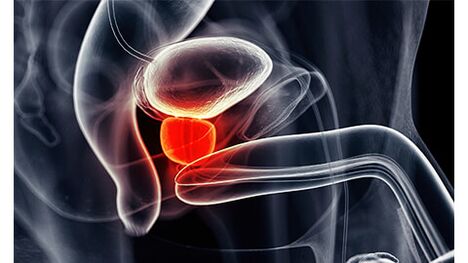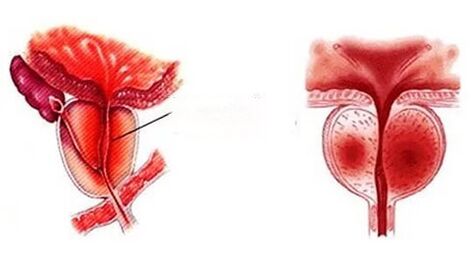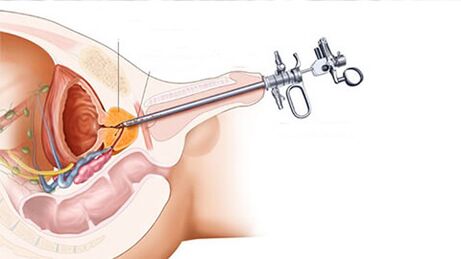
Chronic prostatitis is a slow prostate disease.For him, as for any other chronic pathologies, a change in periods of exacerbations and remissions is characteristic.The disease develops slowly, without delivering almost without anxiety to the patient in the first years, with the exception of individual symptoms that often do not pay attention.However, the progression of pathology may imply a violation of the function of the prostate gland and the development of complications, therefore, it is important to identify it at an early stage.
It can undergo a preventive examination of the urologist in the field clinic.If necessary, an individual treatment regime will be developed for you, thanks to which you will get rid of the disease in a short time and avoid complications.
Characteristics of the disease
Chronic prostatitis in men is one of the most common pathologies of the genitourinary system.About 30% of patients aged 20 to 50 suffer.
The prostate gland is a non -parallel organ located under the bladder.It is responsible for sperm quality: it produces a special secret that is an important component.And during an erection, the iron of the prostate closes the bladder's exit.
The reason for the development of acute and chronic prostatitis is often infections (bacterial, viral or fungal origin).They are able to penetrate the prostate gland through blood, lymph, even if the infection approach is far from the prostate.In addition, infection often falls into the prostate gland directly from the urethra.These two organs are interconnected: prostate ducts open to the urethra.And also through the prostate gland passes the initial part of the urethra.

The infection can be listed in the prostate even without the presence of pathological processes in the body.After all, each organ is characterized by its own microflora.The microorganisms that live in the urethra are harmless in their "habitat."However, for the prostate gland, they can be alien, and if they fall into it, they can cause the development of inflammation.
Prostatitis can be:
- Infectious origin: caused by bacteria, viruses or fungi.
- Stagnant in nature: it develops with a stagnation of the secretion of the prostate gland.
The causes of disease development
The causes of development depend on the form of chronic prostatitis.The infectious form occurs in the following diseases:
- Urethritis
- Orchitis (testicle pneumonia).
- Cystitis.
The source of infection does not have to be located near the prostate gland.The pathology can occur in the context of other infections that progress in the body: caries, sinusitis, pneumonia, bronchitis, etc.
In addition, chronic prostatitis can be developed as a result of an acute unequal process of bacterial origin.
The stagnation of the secretion of the prostate gland occurs due to the stagnation of the blood in the pelvic organs, which may be due to:
- Irregular sex life.
- Sedimentary.
- Using tight underwear.
- Bad habits (alcohol abuse, smoking).
The stagnant form is found in 85% of cases of chronic prostatitis.
The factors that increase the risk of developing the disease in both forms include:
- Regular microtrauma, bruises of the pelvic organs.
- Inadequate nutrition.
- Nervous overloads.
- Wandering sexual life.
- Hypothermia and long stay in an environment with greater moisture.
These factors cause a deterioration in the supply of blood to the pelvic organs, or increase the possibility of penetration of infection in the prostate gland.
The diagnosis of chronic prostatitis is carried out to representatives of some professions more frequently than people with a different type of activity.The risk group includes:
- Truckers and other drivers (forced to be in the same position for a long time).
- Programmers, office workers (sedentary lifestyle).
- Fishermen (remain in the cold for a long time).
- Professional athletes: soccer players, fighters, volleyball players, basketball players (often run the risk of injuries in the pelvic area).
- Sailors and geologists (confronted with adverse climatic conditions: cold, wet).
Chronic prostatitis: symptoms

The symptoms of chronic prostatitis are:
- Pain in the crotch, in the lower abdomen: they can give the rectum, the sacrum.
- Erection disorders, premature ejaculation, lack of ejaculation.
- Urine disorders: Frequent urgency of urinating, difficulties in emptying the bladder, pain during urination.
In the early stages of chronic prostatitis, the symptoms are weak.The pains are insignificant and passes.Urination disorders also occur irregularly.Therefore, the patient often does not give these symptoms of importance to these symptoms and does not consult a doctor.It comes to reception even when the signs of the disease are clearly expressed.
It is even necessary if there are rare symptoms to consult a doctor, otherwise, the disease can cause complications.
Chronic prostatitis complications
The presence of a constant infection approach can lead to its spread to other organs and the development of pathologies in them.The complications of chronic prostatitis are:
- Cystitis is inflammation of the bladder.
- Pyelonephritis - Purulent renal inflammation
- AVAILITE: Inflammation of seed bubbles.
- Orcoepididimitis: inflammation of the testicles and their appendices.
Inflammatory diseases of the genitourinary system, in turn, can bring:
- To infertility.
- to prostate cancer diseases.
- To the adenoma of the prostate.
Reference!In chronic prostatitis, erectile dysfunction often develops.This is due to the fact that the nerves responsible for erection pass through the prostate gland.When a pathological process develops, this often affects them.
Diagnosis
To identify the disease, you must visit a urologist or andrologist.First, the doctor will collect anamnesis: he will listen to complaints and ask questions.Then he will perform a visual inspection and an examination of the prostate fingers.In addition, the following types of research may be necessary:
- Bacteriological examination of urine.
- Microscopic examination of the secretion of the prostate gland.
- Prostate ultrasound.
- Spermogram
- A smear of the urethra (to identify sexually transmitted infections).
- Prostate biopsy.
Treatment of chronic prostatitis
The treatment of chronic prostatitis is mainly conservative.The surgical is carried out only if the therapy does not give the necessary result, or complications arose:
- Prostate abscesses or surrounding fabrics.
- Prostate cancer.
- Prostate adenoma.
- Severe pathologies of the urethra.
Conservative treatment implies the appointment:
- Medications: non -steroidal anti -inflammatory drugs, antibiotics, alpha blockers, immunomodulators, drugs, accelerating regeneration.With severe pain, medication blocks can be prescribed.
- Prostate massage.It allows you to eliminate stagnant phenomena, improve blood circulation in the affected area and the exit of the secretion of the prostate gland.However, before prescribing the massage, additional studies are carried out, since in some conditions it can aggravate the condition.
- Physiotherapeutic procedures.Very often prescribed: magnetic therapy;electrophoresis;laser therapy;Ultrasound therapy.
- Subsistence allowance.With your help, it takes place: eliminating the risk of inflammation aggravation, improving digestive tract, increasing immunity, reducing load in internal organs, normalizing blood circulation throughout the body.It is necessary to eat not construction with food, steamed, cooked or baked in the oven, with a minimum of salt.The base of the diet in chronic prostatitis is low fat fish, lean meat (chicken, turkey, rabbit, beef), cereals, vegetables, macaron products made of integral grain flour, light soups.It is necessary to exclude: fried foods, spicy, fatty, smoked, salty, canned foods, semi-terminated products, fast food, mushrooms, spices, including onions and garlic, citrus, legumes and cabbage, fat, fat meat, strong tea, alcohol, carbonated drinks, sweets and realize concrete.
- In severe cases, surgical treatment is performed. The transureral resection of the prostate gland: the elimination of the pathological site or the complete prostate is carried out without cuts (the device is introduced through the urethra), it is often prescribed for the development of the adenoma of the prostate.Prostatectomy: Elimination of a prostate or its area in the usual surgical form with the implementation of sections.

Chronic prostatitis prevention
To prevent the development of the disease, it is important to timely eliminate the foci of infection in the body.A regular sex life will benefit, excluding random ties.A diverse healthy diet and moderate physical activity will strengthen immunity.It is necessary to avoid hypothermia, a prolonged session (if this requires work, it is necessary to take breaks and choose), closure of underwear.It is also important as a prevention of taking the urologist exams annually.






























